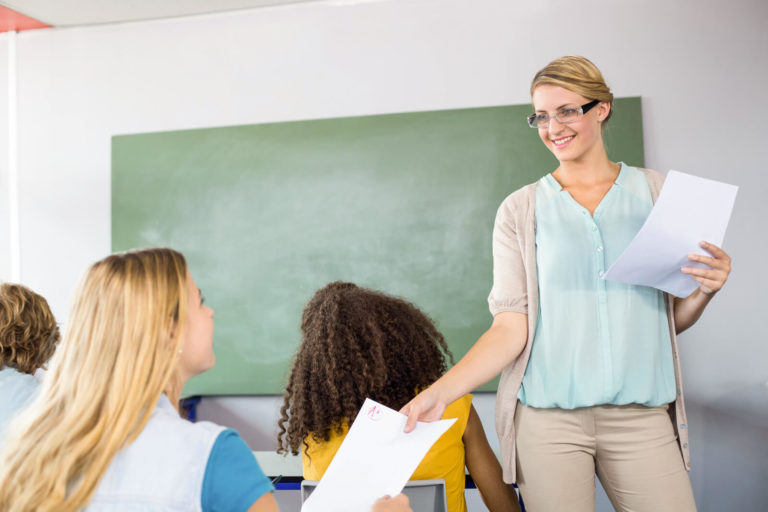Student accountability is about being committed to learning and growing. Through the years, educators have come up with many different ways to hold students accountable, and then March 2020 and the COVID-19 pandemic rolled around and changed everything. Best practices that teachers had come to know were not always effective in the virtual and hybrid learning environments; so it was time to reinvent a part of the wheel and figure out just how to reach students and make them want to do well in a strange and unprecedented time.
Why is Student Accountability Important?
Student accountability is important because it encourages students to take responsibility for their learning and actions. Students, in turn, learn to value their work and likely increase their levels of confidence. This prepares students for life beyond high school, whether it be furthering their education, going into the workforce, or a combination of both. When students are taught the value of accountability from a young age, it carries over into all aspects of their lives, creating a more well-rounded person.
How to Promote Student Accountability
Create a “just right” learning environment.
A “just right” learning environment is exactly how it sounds: a learning environment that is right for your students. An environment where students feel connected to each other is important at any age and grade level. This helps students to take responsibility for their actions and behavior which is important to keep your classroom running smoothly. Having a classroom where students feel trusted, respected, and safe creates an engaging learning environment and one where students expect to be held accountable for their actions by not just their teachers but their classmates and themselves.
Clear expectations.
Clear expectations are important in holding students accountable for learning and assignments. Creating rubrics for projects/assessments and pieces of writing can help students to understand the expectation of assignments. Having clear written directions, as well as verbal directions, for all assignments is also important to ensure students understand what your expectations are. Due dates are so important! Throughout virtual and hybrid learning, having due dates in Google Classroom has helped students to stay organized and on top of their assignments. Having clear expectations gives support from the teacher necessary to ensure student growth and achievement at any grade level and plays a big part in being able to hold students accountable and in students holding themselves accountable.
Have students take ownership of their learning.
As educators, we have all heard the excuse, “Well, my parents didn’t put the assignment in my bookbag”, or “You didn’t tell me I needed to do this.” Students need to own their learning and have an active role in decisions about their learning. It is important to give students a voice in the learning process. This is such an integral part of increasing accountability as it makes students feel responsible for themselves. Mistakes, at any age, are one of the best ways to learn. Errors can lead to learning, and when students hold themselves accountable for their learning, academic, as well as social-emotional growth, is inevitable.
The self-assessment piece.
Self-assessments are a major part of learning. It is imperative for students to reflect on their performance and determine what their strengths and weaknesses are. At a young age, a self-assessment can be as simple as an emoji worksheet where the student circles the emoji that shows how he/she feels about their effort on an assignment.
Another simple self-assessment is a thumbs-up or thumbs-down. You can quickly assess the class on their understanding of a concept or skill in this manner. For upper elementary to high school level students, you can give self-reflection forms for them to fill out after major assessments or marking periods to help students set goals and determine whether those goals have been met. This helps to hold students accountable for their performance.
Support families.
Supporting families is more important now than ever! It is vital to create that strong connection between the school and home work environments. Parents and guardians need to feel supported by the teachers in order to provide the help at home that is necessary for increased success and student achievement. I have observed in my own classroom the successes and achievements of students with families involved and those without. Setting in place the appropriate supports for each student and their families is imperative to their success and also helps to gain support from families in student accountability.
Student, parent, and teacher conferences.
A new twist on the standard parent-teacher conference is involving the students in it as well. Keeping the lines of communication open and involving students more in their education decisions is a great way to increase accountability. These are important discussions, and having student input can really shed a different light on certain situations. Perception is reality and each party could be viewing the same situation differently. Involve students in the problem-solving process and help them to develop that ownership over oneself.
As educators, we need to make students want to come to school. Getting the students through the day (real or virtual) is where accountability begins for the them. This is a major factor in students learning about so many life skills such as time management, self management, and application of skills to the real world. Keeping them involved through all of the processes is vital to their level of accountability and, in turn, their success.
As Denis Waitley stated, “The greatest gifts you can give your children are the roots of responsibility and the wings of independence.” Be a part of giving students the gift of future success through promoting accountability!




